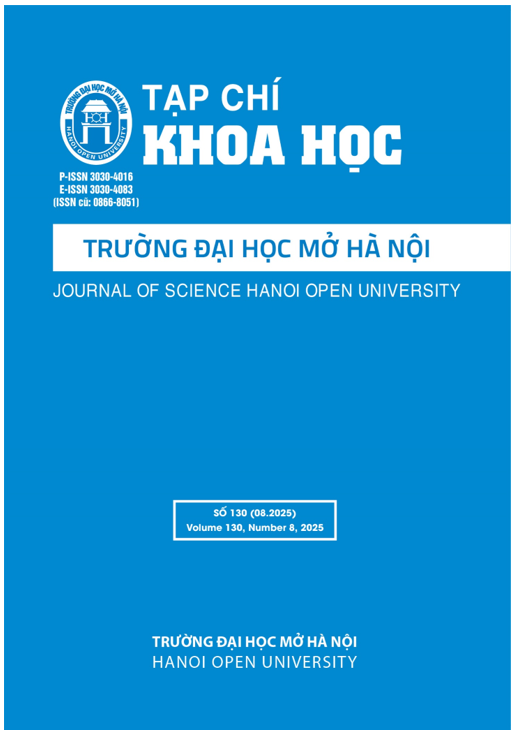CƠ SỞ LÝ THUYẾT VỀ ĐỘNG LỰC NGHIÊN CỨU KHOA HỌC CỦA SINH VIÊN ĐẠI HỌC: TIẾP CẬN TỪ CÁC HỌC THUYẾT ĐỘNG LỰC
DOI:
https://doi.org/10.59266/houjs.2025.658Từ khóa:
động lực, động lực nghiên cứu khoa học, học thuyết động lực, nghiên cứu khoa học, sinh viênTóm tắt
Trong bối cảnh hội nhập quốc tế và chuyển đổi số, hoạt động nghiên cứu khoa học (NCKH) của sinh viên ngày càng trở thành tiêu chí quan trọng để đánh giá chất lượng giáo dục đại học. Tuy nhiên, tại Việt Nam, mức độ tham gia của sinh viên còn hạn chế và động lực chưa bền vững. Bài viết này tổng hợp và phân tích bốn học thuyết động lực kinh điển – Tháp nhu cầu Maslow (1943), Lý thuyết hai nhân tố Herzberg (Herzberg & cộng sự, 1959), Thuyết kỳ vọng Vroom (1964), và Thuyết tự quyết Ryan và Deci (1985, 2000) – nhằm xây dựng khung lý thuyết tích hợp lý giải động lực NCKH của sinh viên. Kết quả cho thấy: (i) Maslow và Herzberg nhấn mạnh vai trò của nhu cầu cơ bản và điều kiện môi trường; (ii) Vroom giải thích quá trình nhận thức về mối quan hệ nỗ lực – kết quả – phần thưởng; và (iii) Ryan & Deci làm rõ cơ chế duy trì động lực nội tại. Khi kết hợp, các học thuyết này tạo nên một khung phân tích toàn diện, vừa bao quát điều kiện nền tảng, vừa giải thích chiều sâu tâm lý và nhận thức của sinh viên. Liên hệ với thực tiễn tại Việt Nam, hạn chế về cơ sở vật chất, sự thiếu công bằng trong cơ hội nghiên cứu, giá trị kỳ vọng thấp và sự phụ thuộc vào động lực ngoại tại đã làm suy giảm đáng kể động lực NCKH của sinh viên. Bài viết nhấn mạnh ý nghĩa lý luận và thực tiễn của cách tiếp cận tích hợp, đồng thời gợi mở hướng nghiên cứu định lượng trong tương lai nhằm đo lường tác động của từng yếu tố, qua đó đề xuất giải pháp thúc đẩy hoạt động NCKH trong giáo dục đại học Việt Nam.
Tài liệu tham khảo
[1]. Adams, J. S. (1965). Inequity in social exchange. In L. Berkowitz (Ed.), Advances in experimental social psychology (Vol. 2, pp. 267-299). Academic Press.
[2]. Brew, A. (2010). Imperatives and challenges in integrating teaching and research. Higher Education Research & Development, 29(2), 139-150.
[3]. Deci, E. L., & Ryan, R. M. (1985). Intrinsic motivation and self- determination in human behavior. Plenum.
[4]. Herzberg, F., Mausner, B., & Snyderman, B. (1959). The motivation to work. Wiley.
[5]. Hoang, T. H. (2022). Extrinsic and intrinsic motivation of Vietnamese students in scientific research: Challenges and opportunities. Vietnam Journal of Education, 6(3), 45-56.
[6]. Kenner, C., & Weinerman, J. (2011). Adult learning theory: Applications to non-traditional college students. Journal of College Reading and Learning, 41(2), 87-96.
[7]. Maslow, A. H. (1943). A theory of human motivation. Psychological Review, 50(4), 370-396. https://doi. org/10.1037/h0054346
[8]. Nguyen, H. T., & Tran, Q. T. (2021). Factors influencing students’ research motivation in Vietnamese universities. Journal of Education and Practice, 12(18), 45-55.
[9]. Page, M. J., McKenzie, J. E., Bossuyt, P. M., Boutron, I., Hoffmann, T. C., Mulrow, C. D., Shamseer, L., Tetzlaff, J. M., Akl, E. A., Brennan, S. E., Chou, R., Glanville, J., Grimshaw, J. M., Hróbjartsson, A., Lalu, M. M., Li, T., Loder, E. W., Mayo-Wilson, E., McDonald, S.,… Moher, D. (2021). The PRISMA 2020 statement: An updated guideline for reporting systematic reviews. BMJ, 372, n71. https://doi. org/10.1136/bmj.n71
[10]. Pham, T. H. (2020). Enhancing student research capacity in higher education: Policy and practice implications. Vietnam Journal of Education, 4(2), 12-20.
[11]. Pintrich, P. R., & Schunk, D. H. (2002). Motivation in education: Theory, research, and practice (2nd ed.). Merrill/Prentice Hall.
[12]. Robbins, S. P., & Judge, T. A. (2019). Organizational behavior (18th ed.). Pearson.
[13]. Ryan, R. M., & Deci, E. L. (2000). Self-determination theory and the facilitation of intrinsic motivation, social development, and well-being. American Psychologist, 55(1), 68-78. https://doi.org/10.1037/0003- 066X.55.1.68
[14]. Snyder, H. (2019). Literature review as a research methodology: An overview and guidelines. Journal of Business Research, 104, 333-339. https://doi. org/10.1016/j.jbusres.2019.07.039
[15]. Steers, R. M., Mowday, R. T., & Shapiro, D. L. (2004). The future of work motivation theory. Academy of Management Review, 29(3), 379-387.
[16]. Tran, N. T., & Le, Q. H. (2018). Barriers to undergraduate research in Vietnam: The role of faculty support and institutional policies. Higher Education Studies, 8(4), 23-34.
[17]. Vroom, V. H. (1964). Work and motivation. Wiley.
